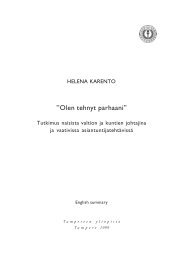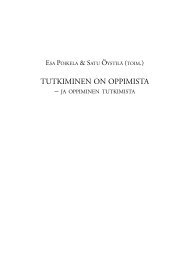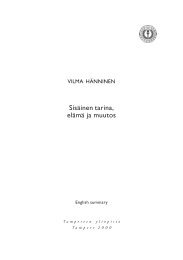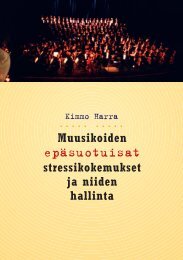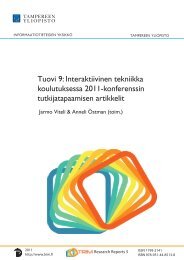Note on this edition: this is an electronic version of the 1999 book ...
Note on this edition: this is an electronic version of the 1999 book ...
Note on this edition: this is an electronic version of the 1999 book ...
You also want an ePaper? Increase the reach of your titles
YUMPU automatically turns print PDFs into web optimized ePapers that Google loves.
86Dem<strong>on</strong>ic Texts <strong>an</strong>d Textual Dem<strong>on</strong>sfuture reading will not be able to d<strong>is</strong>pense with [faire éc<strong>on</strong>omie]; <strong>the</strong> ec<strong>on</strong>omy<strong>of</strong> a written text, circulating through o<strong>the</strong>r texts, leading back to itc<strong>on</strong>st<strong>an</strong>tly, c<strong>on</strong>forming to <strong>the</strong> element <strong>of</strong> l<strong>an</strong>guage <strong>an</strong>d to its regulatedfuncti<strong>on</strong>ing. For example, what unites <strong>the</strong> word “supplement” to its c<strong>on</strong>ceptwas not invented by Rousseau <strong>an</strong>d <strong>the</strong> originality <strong>of</strong> its functi<strong>on</strong>ing <strong>is</strong>nei<strong>the</strong>r fully mastered by Rousseau nor simply imposed by h<strong>is</strong>tory <strong>of</strong> <strong>the</strong>l<strong>an</strong>guage. To speak <strong>of</strong> <strong>the</strong> writing <strong>of</strong> Rousseau <strong>is</strong> to try to recognize whatescapes <strong>the</strong>se categories <strong>of</strong> passivity <strong>an</strong>d activity, blindness <strong>an</strong>d resp<strong>on</strong>sibility.And <strong>on</strong>e c<strong>an</strong>not abstract from <strong>the</strong> written text to rush to <strong>the</strong> signifiedit would me<strong>an</strong>, since <strong>the</strong> signified <strong>is</strong> here <strong>the</strong> text itself. It <strong>is</strong> so little amatter <strong>of</strong> looking for a truth signified by <strong>the</strong>se writings (metaphysical <strong>an</strong>dpsychological truth: Je<strong>an</strong>-Jacque’s life behind h<strong>is</strong> work) that if <strong>the</strong> textsthat interest us me<strong>an</strong> something, it <strong>is</strong> <strong>the</strong> engagement <strong>an</strong>d <strong>the</strong> appurten<strong>an</strong>cethat encompass ex<strong>is</strong>tence <strong>an</strong>d writing in <strong>the</strong> same t<strong>is</strong>sue, <strong>the</strong> sametext. The same <strong>is</strong> here called supplement, <strong>an</strong>o<strong>the</strong>r name for differ<strong>an</strong>ce. 23The famous dictum from <strong>th<strong>is</strong></strong> study – il n’y a pas de hors-texte [<strong>the</strong>re <strong>is</strong>nothing outside <strong>of</strong> <strong>the</strong> text, or, no outside-text] 24 – should be understood in<strong>the</strong> particular sense Derrida gives to “text,” <strong>an</strong>d writing in general. It <strong>is</strong> astructure always marked by a trace <strong>of</strong> <strong>the</strong> o<strong>the</strong>r, <strong>an</strong>d he stresses that“[w]riting c<strong>an</strong> never be thought under <strong>the</strong> category <strong>of</strong> <strong>the</strong> subject” 25 – <strong>the</strong>signified should not be searched bey<strong>on</strong>d textuality, as <strong>the</strong> “text itself” <strong>is</strong> itsown me<strong>an</strong>ing. Th<strong>is</strong> <strong>is</strong> a positi<strong>on</strong> relating to metaphysics: Derrida writes in“The Supplement to Copula” that “‘Being’ presents itself in l<strong>an</strong>guage prec<strong>is</strong>elyas that which <strong>is</strong> bey<strong>on</strong>d what would be <strong>on</strong>ly <strong>the</strong> inside (‘subjective,’‘empirical’ in <strong>the</strong> <strong>an</strong>achr<strong>on</strong><strong>is</strong>tic sense <strong>of</strong> <strong>the</strong>se words) <strong>of</strong> a l<strong>an</strong>guage.” 26 Foucault’sattempt to voice <strong>the</strong> silence <strong>is</strong> for Derrida <strong>an</strong> impossible claim <strong>on</strong> <strong>the</strong>bas<strong>is</strong> <strong>of</strong> a Heideggeri<strong>an</strong> interpretati<strong>on</strong> <strong>of</strong> Being. 27 “L<strong>an</strong>guage’s final protectivebarrier against madness <strong>is</strong> <strong>the</strong> me<strong>an</strong>ing <strong>of</strong> Being,” Derrida claims; 28 everythingtr<strong>an</strong>spires here as if Derrida knew <strong>the</strong> me<strong>an</strong>ing <strong>of</strong> Being. Indeed, heclaims that <strong>th<strong>is</strong></strong> “tr<strong>an</strong>scendental word” <strong>is</strong> precomprehended in all l<strong>an</strong>guages,<strong>an</strong>d that even if <strong>th<strong>is</strong></strong> me<strong>an</strong>ing <strong>is</strong> not tied to a particular word or to a particularsystem <strong>of</strong> l<strong>an</strong>guage, it <strong>is</strong> never<strong>the</strong>less tied to “<strong>the</strong> possibility <strong>of</strong> <strong>the</strong> wordin general.” 29Boyne writes that where Derrida thinks <strong>the</strong>re <strong>is</strong> no “outside-text,”Foucault would ra<strong>the</strong>r claim that <strong>the</strong>re <strong>is</strong> no outside <strong>of</strong> h<strong>is</strong>tory. 30 The dec<strong>on</strong>-23 Derrida 1967/1976, 149-50.24 Ibid., 158.25 Ibid., 68.26 Derrida 1972/1989, 90.27 “If we point out that […] Heidegger d<strong>is</strong>tingu<strong>is</strong>hes <strong>the</strong> me<strong>an</strong>ing <strong>of</strong> ‘being’ from <strong>the</strong>word ‘being’ <strong>an</strong>d from <strong>the</strong> c<strong>on</strong>cept <strong>of</strong> ‘being,’ <strong>th<strong>is</strong></strong> <strong>is</strong> <strong>the</strong> same as saying that for Heidegger<strong>the</strong> c<strong>on</strong>diti<strong>on</strong> for a l<strong>an</strong>guage’s being a l<strong>an</strong>guage <strong>is</strong> no l<strong>on</strong>ger <strong>the</strong> presence within it <strong>of</strong><strong>the</strong> word or <strong>the</strong> c<strong>on</strong>cept (signified) ‘being,’ but ra<strong>the</strong>r <strong>the</strong> presence <strong>of</strong> <strong>an</strong>o<strong>the</strong>r c<strong>on</strong>ceptthat remains to be defined.” (Ibid., 112.)28Derrida 1968/1978, 309n22.29 Derrida 1967/1976, 20-21.30Boyne 1990, 86.



